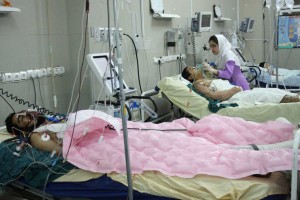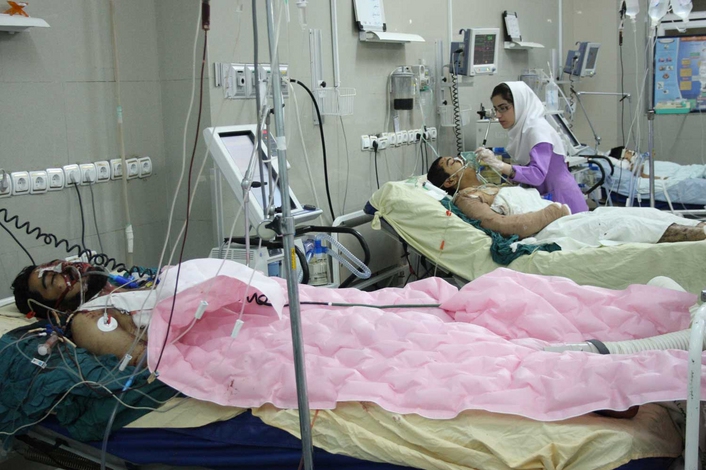
TEHRAN � Sitting on one of the many crowded benches in the waiting room of the International Red Crescent�s pharmacy in central Tehran, Ali, 26, was working his phone. After nearly six weeks of chasing down batches of Herceptin, an American-made�cancer�medicine, Ali, an engineer, was wearing out his welcome with friends and relatives in other Iranian cities, who had done all they could to rustle up the increasingly elusive drug.
At home his mother waited, bald and frail after�chemotherapy�for her�breast cancer, but Herceptin had disappeared from pharmacies and hospitals in the capital.
�So you are telling me that a pharmacy in Qazvin has 20 batches left?� Ali asked, talking about a city two hours� drive east of Tehran. �Please buy whatever you can get your hands on.�
But five minutes later bad news came: �Gone? O.K., thank you for your troubles. If you do find some please call me by the soonest.�
Herceptin, like many other Western-made medicines, has become increasingly hard to obtain in�Iran�as a result of the American-led sanctions meant to force Iran to stop enriching uranium, a critical element in what the United States says is a�nuclear weapons�program.
Iranian doctors, patients and officials say that, in particular, a ban on financial transactions is so effective that even medicines and other critical supplies that are exempted from the sanctions for humanitarian reasons are no longer exported to the Islamic Republic.
The trade measures have led to widespread shortfalls of imported goods and a plunge in the value of the national currency, the rial. On Friday, when Iranians celebrated the annual �Day of Fighting the Global Arrogance,� a k a the United States, student demonstrators in Tehran carrying an effigy of President Obama handed out fliers denouncing the sanctions.
Officials here estimate that potentially about six million patients, many of them with cancer, are affected by the shortages.
For Iran�s sick, it amounts to life on what feels like the front lines of a battle between governments.
Every day patients and their relatives line up at special pharmacies in Tehran, where those suffering from cancer,�hemophilia,�thalassemia, kidney problems and other diseases are increasingly told the foreign-made medicines they need are no longer available.
For Ali and his family, the nightmare started eight months ago, when his mother, a 56-year-old homemaker, felt a small, painful lump in her right breast. After a series of examinations, her doctor told her that she had an aggressive form of breast cancer.
As the members of the family became familiar with long waits in hospital hallways and difficult conversations with soft-spoken physicians, they swore to one another that they would beat the disease. But they never expected to have to go out hunting for medicine.
Ali, who does not want his family name mentioned because he said he had been punished for political activities in college, said that trying to deal with his mother�s cancer had been hard. She needed 14 more batches of Herceptin, he said. Instead of hoping her treatment would cure her breast cancer, he said, he was devoured by worries about obtaining the medicine she needed.
�My mom, us, other patients, we are all caught in the middle of this political battle,� he said. �We don�t have any influence on nuclear policies. We are victims.�
In Iran�s health care system, the government and private employers insure most of the population, paying up to 90 percent for drugs and medical treatments. Medical standards are higher compared with most neighboring countries, and many of those with special diseases receive treatment.
In the 13 Aban pharmacy, Kokan Tashakori, 72, said she left her house at 6:30 a.m. to be first in line for Paclitaxel to treat her�bladder cancer. Mrs. Tashakori, a former nurse, had come to the same pharmacy for three days straight, but each time the pharmacists had told her nothing had arrived.
While waiting, she chatted with Soroud Qazi, 53, from the western Iranian city of Arak, who had a relative undergoing chemotherapy in the capital. �Don�t lose your spirit, my sister,� Mrs. Tashakori told Mrs. Qazi, who was sitting next to her. �But I am losing all hope,� Mrs. Qazi replied, saying her sick family member became depressed when she heard the medicines were not available. �God will save us,� Mrs. Tashakori concluded.
Their faith in a higher power came as they blamed both their own leaders and the United States for the situation they were in. �This is so wrong,� Mrs. Tashakori said of the sanctions. �This is the fault of both governments; they should solve their problems.�
Instead, Mr. Obama has said the Iranian people should blame their own leaders, while Iran�s supreme leader, Ayatollah Ali Khamenei, has repeatedly�called upon his nation�to be steadfast and said that only resistance to the West would lead to victory.
Though the unilateral sanctions put in place by the United States and the European Union have exemptions for medicines and medical equipment, as well as foodstuffs, companies interested in selling such merchandise to Iran require a special license from the Treasury Department�s Office of Foreign Asset Control.
Last month, the office�eased the bureaucracy�that American medical and food exporters faced in obtaining these exemptions, by granting them what it called a �standing authorization,� which means the exemptions no longer have to be obtained on a case-by-case basis.
But the effects of such a move are unclear, since the exporters still face troubles getting paid. Virtually no American or European bank wants to be involved in financial transactions with Iran, no matter what products are involved.
The Treasury Department has been handing down steep fines to Western banks for doing business with Iran.
In September, the British banking giants HSBC and Standard Chartered said they were in settlement talks with the American authorities after having been accused, among other things, of dealing with Iran. HSBC has told its shareholders it made a $700 million provision to cover a possible fine.
�Banks are either afraid, or can�t be bothered to try and do business with Iran,� one Western diplomat in Tehran said, requesting to remain anonymous because of the sensitivity of the subject.
At the Charity Foundation for Special Diseases in north Tehran, Fatima Hashemi, the foundation�s chairwoman and daughter of the former president, Ali Akbar Hashemi Rafsanjani, said her organization had spent most of last year stocking up on�dialysis�machines and special cancer drugs.
�I wish the government had done the same,� she said.
In addition to shortages of medicines, she said, hospital machines were breaking down from a lack of spare parts, and domestic pharmaceutical companies were running out of imported raw materials.
Industry insiders point to a more insidious problem: corruption. Seven years of mass imports have not only made Iran dependent on foreign suppliers, but have also bred a class of predatory officials who get kickbacks from import deals.
One Iranian producer of a vital cancer treatment product, who asked to remain anonymous because he feared losing his license, said he was ready to start production, after three years of investments and quality checks.
�But it turns out the cousin of the health official in charge of signing off on our product had been importing the product in bulk from Europe before the sanctions,� the producer said.
�It�s just bewildering how selfish some of these people are,� he said. Even with stock drying up, �They still will not give us our license to produce inside Iran.�
The Iran Project is not responsible for the content of quoted articles.











